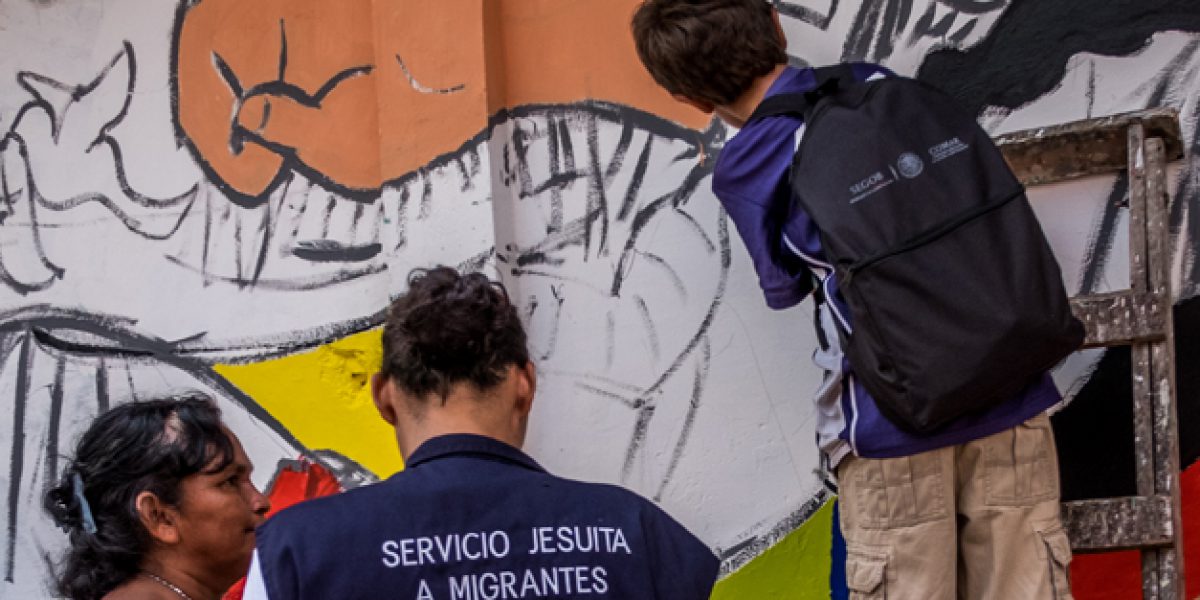JRS insists on the urgency of strengthening protection and refugee systems in Latin American and the Caribbean
28 abril 2024

The regional office of the Jesuit Refugee Service Latin America and the Caribbean (JRS LAC) emphasizing the priority of defending the human rights of refugees and forcibly displaced people, and taking into account that the American continent has become the largest recipient of asylum application in around the world[1], urges States to address the complex situations of displacement of people in the region, based on the highest norms and standards in the field of Human Rights and International Refugees Law.
We highlight the prima facie recognition of refugee status in situations of mass influx, as the most recommended mechanism for its implementation in the States party to the 1951 refugee Convention and regional instruments on refugees, such 1984 Cartagena Declaration.
We also recognize the efforts of various States within the framework of their international protection competence, the complementary and temporary measures to it; the recent announcement by the Colombian government to establish the Temporary Protection Status for Venezuelan migrants ETPV (for its acronym in Spanish), under the temporary protection regime.
Along these lines, various organizations have highlighted the experience of Brazil, which, through de National Committee for Refugees CONARE, in June 2019, recognized that serious and widespread human rights violations were taking place in Venezuela, which led to the application of the Latin-American regional refugee concept, favoring group recognition and the implementation of simplified system of collective determination of refugee status to more than 45.700 Venezuelans (at three times: December 2019: 21.000 refugees, January 2020: 17.000 and august de 2020: 7.700)[2], which has shortened the response time by more than two years.
Nevertheless, we join the call of civil society organizations and Humana Rights defenders, who have questioned the prioritization criteria that have been used in the technological tool implemented by CONARE, the discretion on the applied vulnerability criteria and on recognition of minors under 18 years.
In relation to Colombia, understanding the approach of the ETPV, under the “temporary protection regime”, we state that this is a response to the humanitarian crises and complex or mixed population movements, especially when the existing response are not adequate; therefore, it must be taken into account that temporary measures must be implemented in a way that strengthens and does not undermine the general refugee protection regime in force[3].
The weakening of the asylum and refugee system in Colombia is worrying, which presents challenges in the due process for the Determination of the Status of Refugees (DCR), among which the absence of the principle of reasonable duration of the process is identified, as a procedural guarantee within the framework of the procedures leading to the assessment of international protection needs (CIDH). The delay in the DCR can take up to three years, manifested in the dissuasive nature of the same; added to the above is the excessive discretion of the Advisory Commission for the Determination of Refugee Status, under supposed criteria of confidentiality.
The assessment of the experience of the various mechanisms that the Colombian State has implemented to respond to migration from Venezuela, both refugees and migrants and for nationals returned to the country, could lead to interesting lessons in the framework of a regional and national conversation. We want to insist on the necessary strengthening of the articulation between national (central) and subnational (locals and regionals) governments for the effective implementation of the announced protection mechanisms, maintaining coordination and coherence in institutional policy.
At the same time, we make a call to seek and serve with protection tools the various migratory flows, most of them in transit that cross through the territory of Colombia, beyond the broad Venezuelan flow.
Finally, we identify as a good practice of reasonable time the experience of Mexico, in which, according to the Law on Refugees, complementary protection and asylum of 2011, in its article 24: there are 45 working days, starting the next day after the presentation of the application, to issue a written, well-founded and reasoned resolution on the applications for recognition of refugee status.
However, the asylum and refugee system in Mexico has been weakening, reflected in the cut and budget stagnation in recent years of the Mexican Commission for the Refugee Aid COMAR.
Faced with this regional panorama, we insist on the urgency of a multilateral and coordinated response, based on fraternity, solidarity and shared responsibility, with a focus on protecting the rights of migrants and refugees, guarantees of due process and non-discrimination.
______________________________________________________________
[1] ACNUR, Informe sobre Tendencias Globales – Desplazamiento Forzado en 2019, junio de 2020, page. 39.
[2] El reconocimiento grupal de los venezolanos en Brasil: ¿un nuevo modelo adecuado? Consulted in: https://www.fmreview.org/sites/fmr/files/FMRdownloads/es/reconociendo-refugiados/jubilut-jarochinskisilva.pdf
[3] Formas complementarias de protección, ACNUR. Consulted in: https://www.acnur.org/fileadmin/Documentos/BDL/2002/1761.pdf


